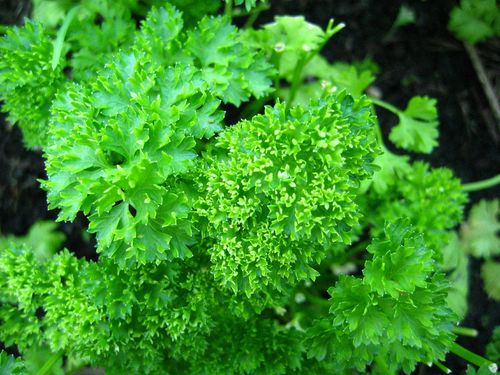Is Parsley Bad For You?
Also Known As: garden parsley
Short answer
For the most part, parsley is not bad for you. It contains vitamins and flavonoids that help fight cancer and diabetes. However, people with certain blood disorders or pregnant women may need to avoid eating large amounts of parsley—the herb can adversely affect these conditions.
Very healthy and numerous health benefits. Harmful qualities may be associated, but aren't usually serious.
View Full Grading System
Category 'A'
Very healthy and numerous health benefits. Side effects are rare. Things rated an 'A+' are typically necessary for survival (for example, water).
Very healthy and numerous health benefits. A few harmful qualities may be associated, but only under certain circumstances such as an allergic reaction.
Very healthy and numerous health benefits. Harmful qualities may be associated, but aren't usually serious.
It is important to note that even the best things in life can become bad in immoderate amounts. So, although something may be rated an 'A+', overconsumption/overdoing can bring unwanted effects.
Category 'B'
Very beneficial to your health. Things rated a 'B+' may have a few harmful qualities to pay attention to.
Overall beneficial to your health. Things rated a 'B' may have some harmful qualities to pay attention to.
More beneficial to your health than not. However, harmful qualities are most likely associated and shouldn't be overlooked.
The main difference between category 'A' and category 'B' is the harmful qualities typically present in 'B' items. Serious side effects are usually uncommon, but are still possible and should be taken note of.
Category 'C'
Both beneficial and harmful qualities associated. Things rated a 'C+' are typically a bit more on the beneficial side. Still, moderation is important.
A fairly even ratio of beneficial and harmful qualities. Moderation is important. Very general topics that can lean towards both sides of the spectrum will be placed here as well. Rice, for example, can be good or bad depending on the type.
More harmful than beneficial. Side effects are common, especially when consumed/done excessively. Moderation is very important.
Category 'C' usually denotes to both good and bad qualities. When it comes to this category, it is important to keep this word in mind: moderation.
Category 'D'
Harmful to your health. Although benefits may be associated, the bad most likely outweighs the good. Moderation is very important.
Harmful to your health. A few benefits may be associated, but the bad outweighs the good. Moderation is extremely important.
Harmful to your health. Very few, if any, benefits are present. Things in this category should be avoided as much as possible.
Category 'D' is typically for things that are more harmful than beneficial. While consuming/doing something unhealthy once in a blue moon shouldn't hurt, we definitely recommend eliminating 'D' items as a regular part of your routine/diet.
Category 'F'
Category 'F' is for things that fail to bring anything beneficial to the table, and are very harmful to your health. We recommend completely avoiding anything in this category. Long-term side effects of 'F' items are usually very serious.
Category 'N'
'N' stands for neutral. Things placed into this category are generally (a) neither good nor bad for you, or (b) lack the necessary evidence to reach any conclusions.
Long answer
Parsley is the world’s most widely used herb. It’s sprinkled atop dishes to give them some color, or mixed into sauces and seasoning to add flavor without spiking the sodium. But in addition to lending a little extra oomph to your meals, parsley offers a host of health benefits.
First, parsley contains Myricetin, a flavonoid found commonly in plants. However, not all plants are as rich in Myricetin as parsley—which is right up there with sweet potatoes and cranberries. Myricetin matters because it has been found to help prevent cancer and lower your risk of developing diabetes.
Second, parsley includes the naturally occurring chemical apigenin. Also beneficial to cancer prevention, apigenin has been shown to decrease tumor growth in aggressive forms of breast cancer. The University of Missouri researchers who performed the study believe that apigenin may soon become an important non-toxic cancer treatment.
Finally, as a green herb, parsley is comprised of higher amounts of chlorophyll—which makes it perfect for grilling! It sounds strange, but grilling foods at high temperatures can actually generate heterocyclic amines, which are known carcinogens. Chlorophyll helps block some of their carcinogen effects, making it safer for you to enjoy the char-grilled foods you love.
So how could parsley possibly be bad for you?
Parsley is a mega-source of vitamin K, which is also its pitfall. Vitamin K helps your body build strong bones, improves your heart health and, most notably, plays a critical role in blood clotting. Without vitamin K, your body would bleed excessively from ordinary wounds. And in just 10 sprigs, parsley supplies two times the daily vitamin K recommendation for adults—but not all adults need to meet those requirements. Vitamin K can counteract certain blood-thinning medications, which could be very dangerous (potentially even life-threatening) for patients who depend on those drugs.
Pregnant women should also avoid eating large amounts of parsley or consuming parsley oil. High doses of parsley can stimulate uterine contractions which may lead to a miscarriage or premature labor. For this very reason, parsley has been used as an abortifacient for many years; parsley juice is still the primary ingredient in a Russian drug used to induce labor.
If you are unsure about whether or not parsley should be incorporated into your diet, consult your physician—especially if you are on blood-thinners, pregnant or planning to become pregnant.
Possible short-term side effects
- interferes with blood-clotting drugs
Possible long-term side effects
- premature labor
-
miscarriage
Ingredients to be aware of
Benefits
- gives food color
-
improves taste without extra sodium
-
helps prevents cancer
-
reduces risk of diabetes
Please turn your Ad Blocker off to see this content. Thank you!

 Approved by
Approved by 















